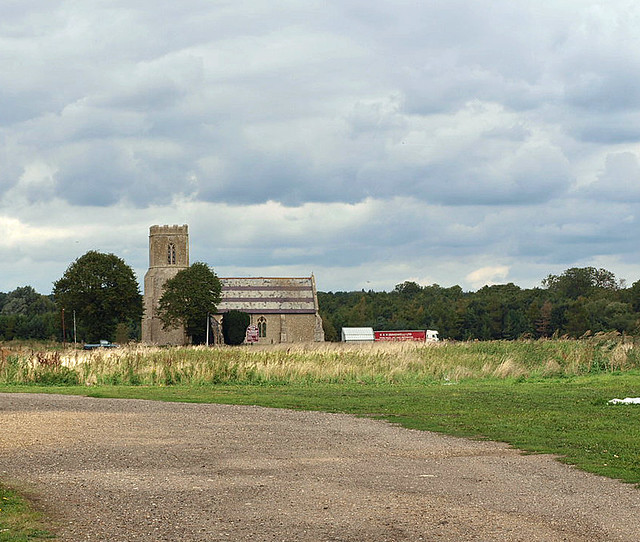ST DENIS. Nave and chancel Norman, W tower Dec. The N and S doorways have one order of shafts with scalloped capitals and altered arches. Handsome E window of c. 1300. Three lights, a big circle and in it a finely cusped pointed trefoil and three little circles. In the N wall pretty niche with a nodding ogee arch in the canopy. - PLATE. Silver-gilt Cup and Paten c. 1680.
Index
▼
Monday, 10 September 2018
Wangford, Suffolk
St Denis, redundant and now used by American baptists from the adjacent Lakenheath airbase, is a contender for the strangest visit to date. I parked in the viewing area and walked alongside the perimeter fence, then past a free range chicken 'farm' until I spotted the church. With hindsight I should have ignored the no unauthorised access sign and just driven to the church but I'm afraid at the time my nerve failed me, hence the distance shot.
ST DENIS. Nave and chancel Norman, W tower Dec. The N and S doorways have one order of shafts with scalloped capitals and altered arches. Handsome E window of c. 1300. Three lights, a big circle and in it a finely cusped pointed trefoil and three little circles. In the N wall pretty niche with a nodding ogee arch in the canopy. - PLATE. Silver-gilt Cup and Paten c. 1680.
WANGFORD. A village (near Brandon) with a small 600-year-old church alone on the heath, it is almost lost in the pine woods. The church has been refashioned, but has some medieval windows, a square Norman font, a holy water stoup in the porch, and a brass tablet to Dorothy Francklyn, a sister of Queen Elizabeth’s Attorney-General Sir Edward Coke, the lawyer who was not ashamed from his high place on the Bench to call Sir Walter Raleigh a viper. The village was the home of another ruffianly judge, Sir Robert Wright, who was born at Wangford Hall, still standing in the trees not far from the church. He was a vicious and ignorant fellow who made his way by becoming the tool of Judge Jeffreys. At the time of the Monmouth rebellion he was appointed Chief Justice, and daily sent deserting soldiers to be hanged in sight of their regiments. He presided over the trial of the Seven Bishops, but was unable to prevent the jury’s verdict of Not Guilty which sounded the death-knell of the Stuarts. With the landing of Dutch William, Wright was impeached for treason and corruption and fled into hiding, but he was discovered and flung into Newgate, where he caught fever and conveniently died in 1689.
ST DENIS. Nave and chancel Norman, W tower Dec. The N and S doorways have one order of shafts with scalloped capitals and altered arches. Handsome E window of c. 1300. Three lights, a big circle and in it a finely cusped pointed trefoil and three little circles. In the N wall pretty niche with a nodding ogee arch in the canopy. - PLATE. Silver-gilt Cup and Paten c. 1680.

No comments:
Post a Comment